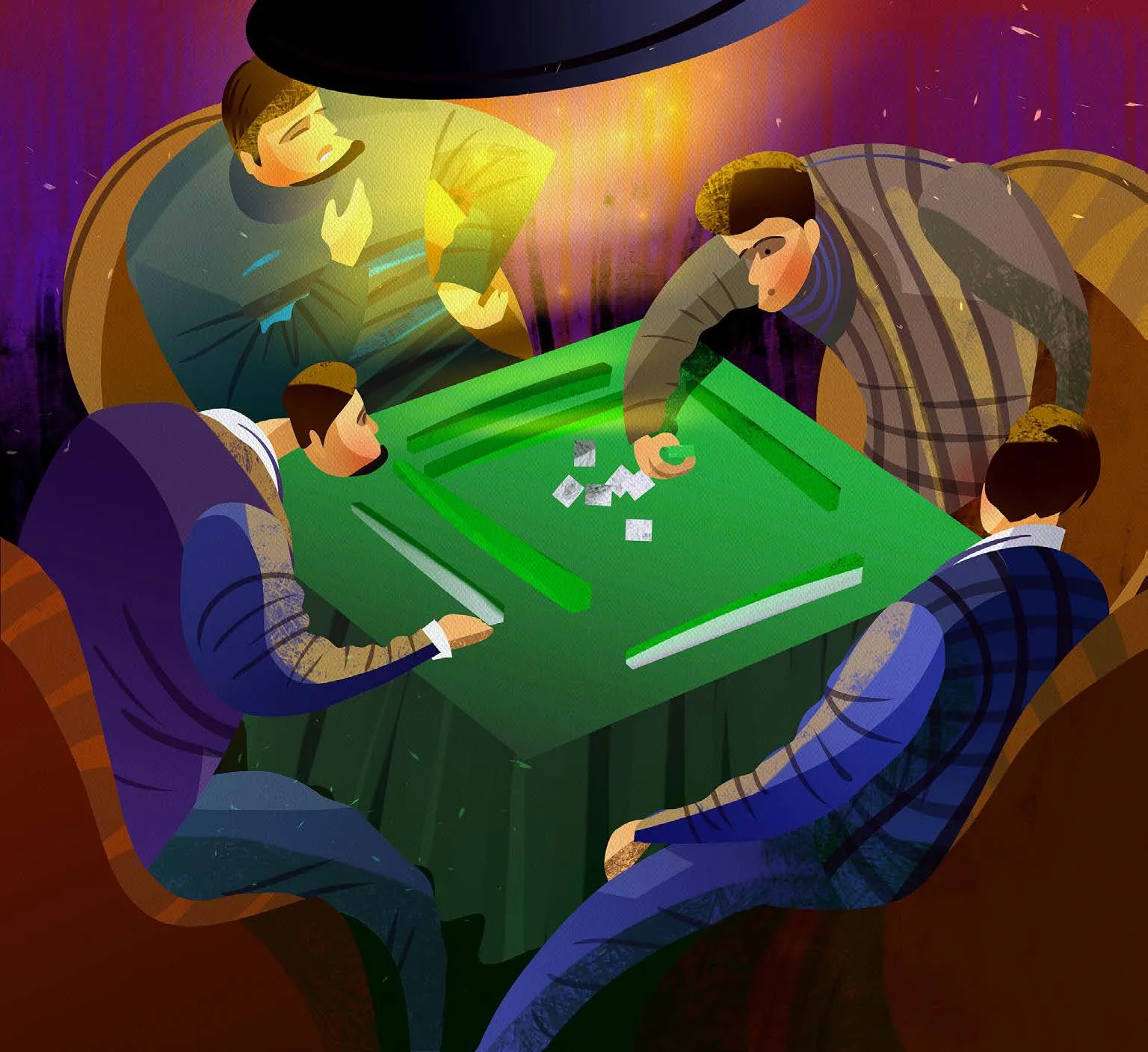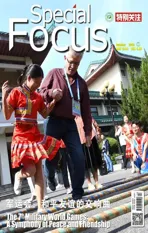Jewish People Love to Play Mahjong
2019-11-26ByQiuYin
By Qiu Yin
When I saw a group of Jewish people playing “four circles”and the Jewish mahjong society the first time I went to the Marcus Jewish Community Center of Atlanta (MJCCA), I was totally shocked.
Mahjong on the Beach
Whenever I went to the MJCCA to play table tennis, I would always see Jewish women playing mahjong. I checked it out on one occasion and saw that they were playing the version of Mahjong popular in Taiwan, China.
Their mahjong tiles were brickshaped, green-colored, and clatter loudly. There were also birds,trees, and Chinese characters on the tiles: East, West, South,North, Middle, as well as Seven Wan and Five Wan. Jewish people don't know Chinese characters,so there are English and numbers in the upper left corner of the tile. For example, 7 Wan is 7, and 5 Wan is 5 while letter E is for Chinese character East and letter W for West. When they discard 7 Wan, they would call “seven cracks!” and “three dots!” while discarding three cylinders. “Tiao”is called “suo” in Taiwan, China,while they called it “bamboo.” So when they discard six bamboo,they would call “six bams!”and “flower” for Hua, “red” for Hongzhong (red dragon), “green”for green dragon, “South” for Nan, and “East” for Dong. While mahjong is usually played with 4 players, it was not uncommon to see these Jewish people playing mahjong in threes.

Once, I chatted with a guy at the MJCCA and asked him, “How long have Jewish people been playing mahjong in history?”The man told me that it started a long time ago, from 1920 or even earlier.
“Are there lots of Jewish people playing mahjong?” I asked.
“Lots. From New York City to surrounding suburbs. In places where the Jews gather, such as synagogues, Jewish centers, and elderly centers, even when they go to beach vacations, you'll see them playing the game. While most Americans sunbathe on the beach,Jewish Americans play mahjong on the beach without sunscreen on.”
“Mahjong on the beach?” I was amazed.
“Yes, it's actually big fun playing mahjong on the beach,with the gentle caressing sea breeze, the pleasing sound of the waves, the refreshing smell of sea water, as well as good food, fine wine, and fresh air...”
In fact, Jewish people not only play mahjong on the beach, but also at resorts. At the Holiday Cabin in the Catskill Mountains,a famous Jewish resort in New York, when you hear the sound of tiles clattering and clicking, don't presume that's Chinese people out there—it's definitely Jewish people, most of whom immigrated to the United States from Eastern Europe.

Jewish people say “Mah-Jongg!” with an emphasis at the end, because they consider it a great game which allows people to forget about mundane life,slows down the aging process,brings about new friends, dispels loneliness, and even helps to forget about one's illnesses.Mahjong is also related to charity and Judaism. The Jews believe that mahjong is sparrow, because there are sparrows in mahjong,and mahjong is like sparrows with wings, which enable people to fly freely.

A Tool to Make Friends
In Taiwan, China, both genders play mahjong and are equal players at the table. Jewish people are different. Mostly just Jewish women play mahjong and I have never seen a Jewish man playing it. However, my classmate Eide, a 70-year-old Jewish male, told me that his mother and aunts used to play mahjong every week, and he used to join them quite often.
“I haven't played for more than 20 years. Mahjong is a fun and interesting game, though.”
“Why did you stop playing then?” I asked Eide out of curiosity.
“My mother and aunts passed away more than 20 years ago. I have no one to play with now.”
I asked another friend, Ernie,a 90-year-old Jewish man: “Why don't Jewish men play mahjong?”His answer was straightforward:“Mahjong is woman's game;Jewish men play Bridge and Pinochle.”
During the Second World War,American Jewish men left home to fight, while Jewish women stayed behind at home to look after their children. Loneliness and boredom were commonly felt by everyone, so Jewish women played mahjong together,sharing their experiences of raising children over the table,and trading stories about their husbands on the battlefield.That's how mahjong became a popular game for Jewish women.Later, when people moved to a new city, they were also able to meet and mingle with the new community via mahjong,which became a tool for helping them settle down. Women have a nature for sharing and enjoy helping newcomers adapt to a new environment.
What Jewish People Value
Jewish women play mahjong differently from Chinese. They usually play for about 2 hours,instead of hanging around on the table for a day and night, or even worse, three days and three nights without sleep. In their philosophy,child-raising is the most important thing and family always comes first. Mahjong is just a game to add some fun to life, and it should by no means affect their family or children. Moreover,their wager is usually between 3 to 5 US dollors. Therefore, when someone loses, it'll be just the cost of a ticket for a movie or a treat meal to a friend—not a big deal anyway.
Jewish people are careful with their money. What they really want is value rather than price,fun rather than risk, playing rather than gambling.
For Jewish people, money is sacred. It can be spent for fun, can be donated for charity, yet cannot be gambled. For Jewish people,gambling has no “value.”
Some Jewish women play mahjong once a week while some three to five times per week.Usually, they have their own team. In the synagogue library of Atlanta, there are usually two tables with eight Jewish women playing mahjong every Thursday.
They bring food and drink from home and share with each other. They laugh and chat while playing. “Come join us.” They would invite me enthusiastically while others were generous enough to give me their spots. The mahjong they play is with 13 tiles.
Playing Mahjong and Reading Prayers
My Jewish friend Rene, a 94-yearold lady, said to me: “You should really learn to play mahjong. I assure you it is fun and engaging.”
Rene has a full schedule every day, playing Bridge, Pinochle, and mahjong “when she has time.” In her 90s, Rene dresses up like a young girl, beautiful and happy every day.
Having been playing mahjong for more than 70 years, Rene enjoys it as she did with her boyfriend in her youth.
Once I went to the synagogue,and there were only six people sitting at two tables. They invited me to join with enough enthusiasm, yet without too much pressure. I asked them in curiosity, “You are short of one player, can you still play?”
“We sure can. 3 people play faster than 4.” I was told.
It turned out that they set up for the absentee as well, only without taking any tiles from the absentee's rack.
These Jewish women also pray together in Hebrew before they start playing.
“There are about 40 members in the mahjong club of the synagogue. Some groups play on Mondays, some on Tuesdays, and some on other days. We play on Thursday afternoon. The mahjong on Thursday is without wagers,losing or winning. On Tuesday people play Chinese style with wagers, yet in general, we play with small wagers,” said one lady.She did not tell me how much exactly was their wager and I did not ask.
One of the women, Rita, is the mahjong teacher and has taught quite a lot of students so far. The mahjong group of the synagogue continues to grow.
(From Truth: Jews Are Not What You Think, International Cultural Publishing Company.Translation: Lu Qiongyao)
